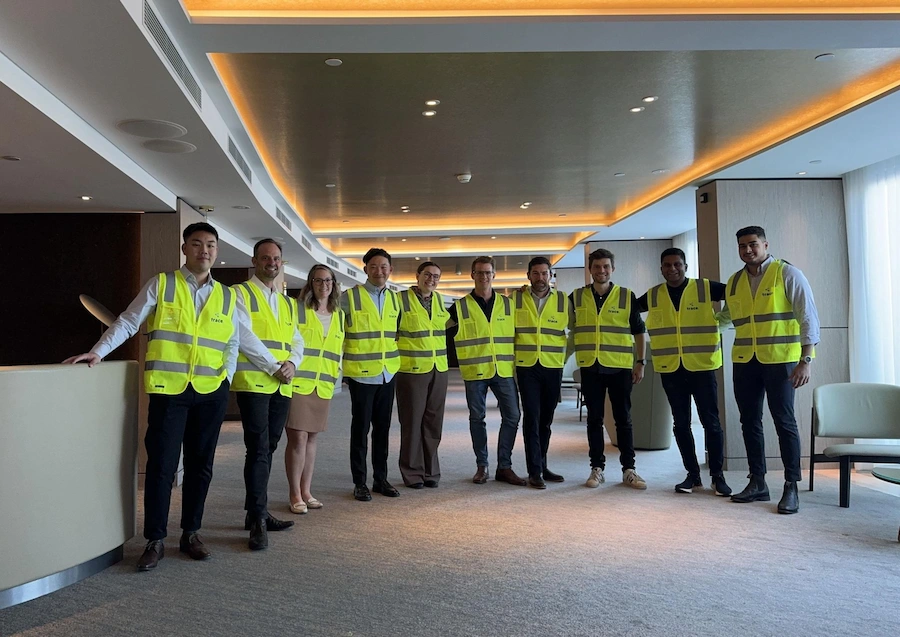AI growth is accelerating demand for energy and water. Here’s what it means for procurement, contracting, supplier markets and operating models, and how Trace Consultants helps organisations adapt with smarter supply chain strategy.
How AI will transform energy and water supply chains (and what it means for procurement)
The rise of artificial intelligence isn’t just changing software. It’s rewriting the supply chain for energy and water. Across Australia and New Zealand, hyperscale data centres and AI-driven workloads are accelerating demand for electricity, cooling water, construction materials, and maintenance services at a scale the region has never seen.
For governments, utilities, and the private sector, this new digital infrastructure boom requires step-change investment not just in generation, transmission, and treatment capacity, but in the supply chains and procurement systems that deliver them.
The implication is simple but profound: the next decade’s challenge is no longer “build and connect.” It’s “source, deliver, and sustain.”
The supply chain behind AI: why everything changes
AI systems rely on high-density data centres that run 24/7. These facilities:
- Consume vast power — hundreds of megawatts per campus, rivalling small towns.
- Demand constant cooling — millions of litres of water or high-performance closed-loop systems.
- Require complex materials and equipment — transformers, switchgear, chillers, pumps, heat exchangers, fibre, batteries, and backup generation.
- Depend on large-scale logistics coordination — moving specialised components through ports, warehouses, and remote project sites.
That mix turns AI into a multi-sector supply chain event: energy, water, construction, logistics, maintenance, and technology all converge.
These dependencies will test Australia and New Zealand’s supply chain maturity in ways few industries have experienced outside of resources mega-projects.
Supply chain step-changes the energy sector must make
1) Rebuilding procurement for scarce equipment
The global market for transformers, HV cables, and substation components is already under strain. Lead times stretch from months to years.
Energy supply chains must move from transactional tendering to strategic sourcing, securing allocation through forward contracts, supplier partnerships, and regional manufacturing agreements.
Procurement must:
- Forecast demand early, aggregate volumes across projects, and negotiate multi-year supply.
- Diversify supplier bases and qualify alternates to reduce dependency risk.
- Build transparent cost models to navigate inflation in metals and logistics.
- Use digital procurement tools to track commitments, delivery, and supplier capacity.
2) Local manufacturing and supplier development
Given global competition for electrical gear, local capability building becomes critical. Energy networks and developers will increasingly rely on domestic assembly, regional repair facilities, and Australian/NZ-certified alternatives.
This requires government and industry collaboration to:
- Identify bottlenecks (e.g., transformers, switchgear, battery enclosures).
- Incentivise local suppliers to scale up with grants, co-investment, and anchor contracts.
- Introduce transparent qualification pathways for approved local vendors.
3) Integrated logistics and construction supply chains
AI-driven power projects need rapid, parallel execution across substations, transmission lines, and storage sites.
That demands end-to-end logistics visibility — from factory to foundation — and multi-tier coordination across EPCs, transporters, and field contractors.
Procurement teams must design contract frameworks that link:
- OEMs (original equipment manufacturers),
- Freight forwarders,
- Civil and electrical contractors, and
- Local suppliers — into one coordinated schedule.
Delays at any node ripple downstream; proactive supply chain integration is the new critical path.
4) Resilience and circularity
With more assets entering service faster, spare-parts supply and recycling will become strategic issues.
Energy organisations should:
- Establish pooled spares frameworks across operators.
- Contract for refurbishment and circular reuse (e.g., transformer oil recovery, copper recycling).
- Build resilience into supplier networks through dual sourcing and scenario planning.
Supply chain step-changes the water sector must make
1) Recycled water as the new commodity
Cooling data centres with potable water is unsustainable. Utilities and developers must create recycled-water supply chains that mirror energy supply contracts — long-term, multi-party, and performance-based.
This means:
- Treating recycled water as a traded product, with clear service levels, quality standards, and pricing models.
- Procuring treatment and pumping assets under framework agreements to avoid long approval cycles.
- Embedding recycled-water offtake clauses in land and development deals.
Procurement must move beyond project-by-project sourcing to portfolio-level management of treatment capacity, storage, and distribution.
2) Technology supply chains for cooling
AI’s thermal intensity requires new cooling technologies — liquid immersion, heat exchangers, hybrid evaporative systems. These rely on global OEMs and niche component suppliers.
The challenge: most of this equipment has limited regional stock and long import lead times.
Smart buyers will:
- Develop early vendor relationships for cooling systems and specialised parts.
- Establish bonded storage or local assembly hubs for critical components.
- Partner with universities and startups to trial lower-water-intensity cooling designs.
3) Service and maintenance procurement reform
Water authorities and data-centre operators will need to expand long-term maintenance frameworks for pumps, valves, sensors and treatment plants.
These contracts should:
- Incentivise reliability and uptime, not just labour rates.
- Embed KPIs on leakage, efficiency, and water-quality compliance.
- Include joint performance dashboards and predictive maintenance clauses.
This shift repositions procurement as a partner in resilience, not merely a cost controller.
Cross-sector procurement implications
1) Competition for inputs
AI infrastructure competes directly with traditional industry, renewables, and housing for skilled labour, steel, copper, cement, and water rights.
Procurement teams must anticipate scarcity and secure long-lead inputs before price shocks occur.
2) Shift from capex to whole-of-life contracts
With assets that will operate continuously for decades, procurement must evaluate total lifecycle cost, not just upfront pricing.
That means:
- Bundling operations, maintenance, and performance guarantees into single commercial frameworks.
- Embedding flexibility to integrate future cooling or power technologies.
Investors and regulators will expect transparent reporting on embodied carbon, water consumption, supplier ethics, and circularity.
Procurement leaders must:
- Source from verified ESG-compliant suppliers.
- Track emissions and water use through digital procurement platforms.
- Reward suppliers for innovation and sustainability outcomes.
4) Digital supply chain integration
AI will also reshape how supply chains are managed: predictive analytics, supplier-risk scoring, automated tender evaluation, and AI-assisted contract drafting are emerging capabilities. The irony is clear, AI itself will help manage the AI-driven infrastructure boom.
Procurement organisations that invest early in AI-enabled category management, forecasting, and scenario analysis will handle volatility with confidence.
The strategic role for supply chain leaders
Energy and water operators that succeed in this environment will elevate supply chain and procurement from back-office functions to strategic levers.
That involves:
- Embedding supply chain leads in infrastructure planning and project governance.
- Creating cross-functional “war rooms” that link procurement, logistics, engineering, and operations.
- Establishing supplier councils to foster innovation and resilience.
- Investing in workforce capability: contract management, negotiation, analytics, and sustainability.
When the physical networks (grid and pipeline) are at full stretch, the commercial networks (contracts and suppliers) become the real differentiator.
As a boutique Australian advisory firm specialising in supply chain and procurement strategy, Trace Consultants helps organisations in both the public and private sectors navigate exactly these types of transformations.
Our services include:
We assess end-to-end supply networks to identify bottlenecks, risks and optimisation opportunities. Our team develops strategies that align procurement, inventory, and supplier ecosystems with growth in AI-related energy and water demand.
2) Category management and strategic sourcing
We help organisations build category strategies for:
- Electrical infrastructure (HV equipment, transformers, cabling).
- Water treatment and pumping systems.
- Construction and maintenance services.
- Technology and operational support contracts.
Trace facilitates market engagement, tender evaluation, contract negotiation and supplier onboarding, ensuring every category is future-ready.
We design governance, processes, and systems that make procurement a strategic enabler, balancing cost, risk, and sustainability. This includes digital procurement frameworks, supplier relationship management, and performance reporting models tailored for critical infrastructure.
Trace supports clients to map supplier dependencies, stress-test logistics flows, and build resilience plans across power and water networks. We help clients anticipate and mitigate risks from global shortages, climate impacts, or local disruptions.
We integrate ESG considerations into sourcing decisions, ensuring energy and water projects align with carbon and circular-economy commitments. Our team helps define supplier KPIs and reporting frameworks to meet evolving investor and regulatory expectations.
Where to begin:
- Map your supply exposure.
Identify where energy and water demand from AI infrastructure will intersect with your current supplier base, contracts, and material pipelines. - Prioritise the scarce.
Forecast requirements for transformers, pumps, switchgear, cables, and cooling systems. Secure early procurement positions or framework agreements. - Engage suppliers strategically.
Move from transactional purchasing to multi-year partnerships that share risk and drive innovation. - Strengthen governance and visibility.
Establish digital dashboards to monitor lead times, capacity, and supplier performance in real time. - Embed sustainability in every category.
Ensure water and energy efficiency, recycled content, and circular practices are built into supplier evaluation and contracting.
AI isn’t just transforming data and software, it’s transforming the supply chains that keep modern economies running. For Australia and New Zealand, the convergence of data-centre expansion, renewable energy build-out, and recycled-water infrastructure will create both constraint and opportunity.
The organisations that thrive will treat supply chain and procurement as strategic functions, building resilient partnerships, securing critical inputs early, and embedding sustainability from the ground up. That’s exactly where Trace Consultants operates best.
If your organisation is preparing for the next wave of AI-driven infrastructure growth, Trace Consultants can help you plan, procure, and perform with confidence.
Contact us to discuss how Trace can help strengthen your supply chain strategy and procurement frameworks for the AI-powered future.










